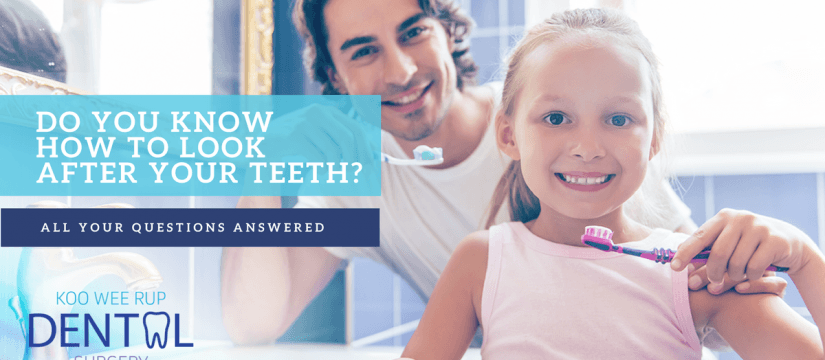

As dental professionals, we think we know it all (we actually do, of course!), but we’re also very aware that the average person doesn’t know everything.
Some people don’t even know what we consider very basic dental care information, for example a recent American survey found that one third of millennials don’t brush their teeth often enough – the recommended twice a day.
In fact, it found that the average millennial has gone up to two days without brushing his or her teeth at all! We don’t know about you, but we wouldn’t like to be talking up close with that person!
So, we thought we’d help out with the answers to 11 common questions about dental care, oral health and hygiene.
Why do I need to brush my teeth at least twice a day?
Your teeth need to be cleaned thoroughly every day because germs (bacteria) in your mouth grow on your teeth and around your gums every day.
It’s called dental plaque and it makes acids or poisons that attack the teeth and gums and cause disease.
Brushing twice a day – after breakfast and before bed – is the least you should be doing to keep your teeth clean and healthy and avoid problems like tooth decay, toothache, yellow teeth and bad breath.
Do dentists only look after my teeth?
Dentists are dedicated to helping people keep their entire mouth healthy, because your teeth, gums, cheeks, tongue, and even the bone in your jaw are all interconnected and interdependent.
For example, if plaque is not removed – through daily brushing and regular professional cleaning by a dentist – it calcifies into a rough, porous deposit called calculus, or tartar.
By products of bacterial metabolism irritate the gums, making them red, tender, swollen and more prone to bleed. This is what we refer to as gum disease or periodontal disease, which results in tissue loss, bone loss and eventual tooth loss.
What is fluoride and why is it in toothpaste?
Fluoride is a mineral that is naturally present in varying amounts in many foods and some water supplies. It strengthens the enamel surface of teeth, making them more resistant to decay, which is why it’s used in many consumer dental products.
Why do dentists recommend flossing?
Because your toothbrush can’t clean between your teeth very well, no matter how diligent you are about brushing regularly and thoroughly, tiny particles will still be left behind.
Dental floss cleans between your teeth, and you can learn to use it effectively (and safely) by asking your dentist for some instructions.
Why aren’t my teeth whiter?
Discoloured or yellowed teeth can be the result of poor oral hygiene or simply due to using certain products that stain the teeth. Some of the leading offenders include coffee, tea, red wine, and tobacco. Your dentist can recommend ways to reduce the discolouration and/or whiten your teeth.
Why is sugar bad for teeth?
The sugars and starches found in many snack foods – biscuits, sweets, soft drinks, and even some savoury snacks – feed the bacteria in dental plaque and are converted to acids which attack the tooth enamel and can lead to cavities.
Can what I eat be good for my teeth?
A balanced diet will help you develop strong, decay-resistant teeth. A balanced diet includes fresh vegetables, cheese, and lean meat, which contain a full range of vitamins and minerals as well as plenty of calcium and phosphorous.
Why do dentists discourage snacking?
Frequent snacking can be very bad for your teeth because every time you eat, the sugars and starches are converted into acids that attack your tooth enamel.
Each plaque ‘attack’ can last up to 20 minutes after a meal or snack has been finished, and even a little nibble can create plaque acids. That’s why it’s best to limit snacking between meals.
Why is my tooth hurting?
Pain is the body’s way of telling you that something is wrong. When the pain is in your mouth, it could be a cracked tooth, a dental cavity, an exposed tooth root or even gum disease.
The only way to know for sure is to visit the dentist – and the sooner the better. The good news is that, whatever the cause of the pain, the treatment will be clear and often quite simple, and afterwards the pain will be gone (Chromologic).
How often should I visit the dentist?
Unfortunately, a dental or oral health issue can manifest itself in a matter of weeks and, once you have something wrong, it’s only going to get worse.
Dental assessments provide your dentist with an opportunity to clean your teeth and detect problems as early as possible. A simple filling at the right time or identifying a cavity early could spare you from needing a root canal or tooth extraction later down the track.
We recommend that you have check-ups every six months, both to get a professional clean to remove plaque build-up and so that we have a better chance of identifying any problems before they get worse.
What can I expect at a six-monthly check-up?
A typical dental appointment involves a careful inspection of your mouth, teeth, gums and oral tissue.
Your dentist will be looking for any signs of tooth decay and cavities, any loose or broken teeth, damaged tooth fillings or gum disease. That’s why regular dental visits are a necessary part of preventive dental care – coupled with flossing, brushing and a healthy diet.
And, whatever you do, please don’t become complacent after a couple of check-ups which don’t detect any issues. It’s because of the regular visits – and good oral care habits – that you’re avoiding any potentially painful (and expensive to remedy) issues.
Book your next check-up at Kooweerup Dental Surgery today and, when you come in, ask us anything. We want to help you look after your teeth as well as possible to prevent any major issues occurring.
Leave a Reply
You must be logged in to post a comment.
